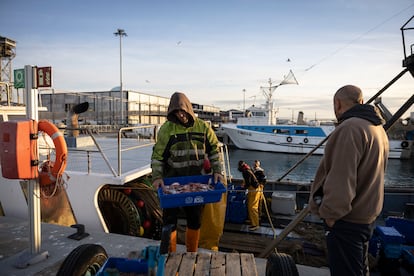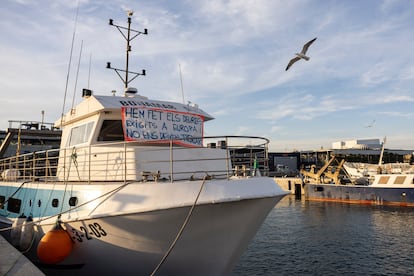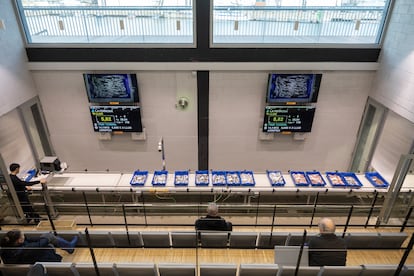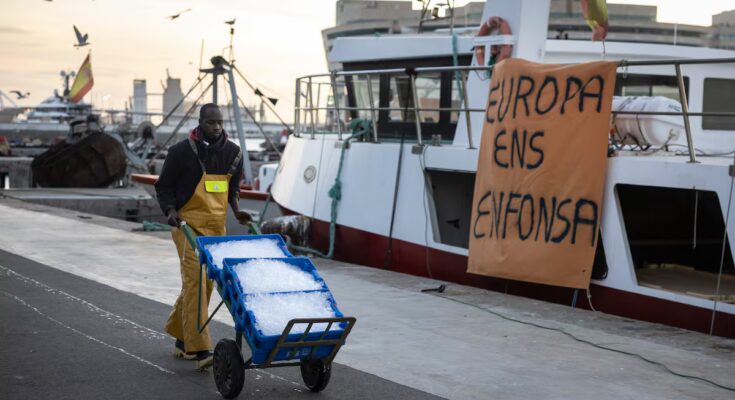The Ministry of Agriculture and Fisheries, representatives of the affected autonomous communities and the fishing sector send a common message to Brussels: the fishing days authorized by the European Union make the activity unsustainable. In 2025, each of the 556 vessels in the Spanish trawling fleet had on average only 130 days authorized to fish. With this limit, the survival of the trade depends on financial aid which, according to the sector, arrives late: “Which factory in Spain stops in November and puts all its workers on unemployment? We want them to let us work, not subsidies”, summarizes Josep García, a Catalan fisherman and shipowner. With requests for extension of days still pending, the State Administration has committed to informing the sector this Monday on the progress of the talks with the European Commission and the options that the fleet will have to operate until the end of the year in the Mediterranean Sea.
Since 2020, the European Union’s regulatory fence has tightened and working days have been reduced to meet sustainability requirements. In 2024, 12 cumulative compensation mechanisms were agreed, meaning if the fleet met certain requirements, it could get additional days. “We have done all our homework, perhaps Brussels doesn’t take so much into account the impact on the profession and on the people who have practiced it all their lives,” comments fisherman García.



These conditions include the reduction of activities in protected areas, the use of new nets, the presence of scientists on board and the installation of flying doors to minimize the impact on the seabed. Starting from the first 27 days proposed last year, the sector claims to have tried to comply with all the requirements and that the fleet has managed to extend them up to the 130 currently allowed. But by the end of November more than 90% of the boats will have already used up that quota and fishermen assume it will be a Christmas of frozen fish.
In the Barceloneta market, Catalan sellers fear the lack of supply and rising prices. “There is a risk that there will be a shortage of anchovies and sardines because the sea is full of tuna, which won’t let us fish and eat all the small fish,” says Jesús Antón Montoza, who has experienced firsthand the changes in fishing policy for 5 years and has gone from being a fisherman to becoming a fishmonger: “It’s impossible to make a living from fishing in Spain.” Montoza began his profession at 13 with his stepfather in artisanal fishing, at 21 he moved to trawlers and, with the snip, he no longer reached the minimum days of work per year, was unable to apply for unemployment and risked jeopardizing his pension. He had to leave the sea.
On Monday we will send the Mediterranean sector precise indications on the possibilities for activity until the end of the year.
We continue our dialogue with the European Commission to extend fishing days and thus guarantee the future of our fleet.
Today, inside @DespiertaCSur pic.twitter.com/zfQKOsK4xO
— Luis Planas Puchades (@LuisPlanas) November 21, 2025
The ban on the departure of fishing boats is not limited to blocking days. In some cases, the number of kilos of some species is also limited. Many skippers (responsible for navigation) reserve some days of the year for periods in which fish are best sold, such as Christmas, but the calculations never work out. “It’s not an exact calculation. Sometimes we have days but not kilos, sometimes kilos and not days,” says the skipper of the Barcelona Fishermen’s Guild, José Juan Juárez. The brotherhood had to advance aid of 1,200 euros to workers who cannot go to sea so that they can support themselves. «The common feeling is that we are penalized for wanting to work», he summarizes.
If the limits imposed by the law are exceeded, the sanction can lead to fines and even the withdrawal of licenses. The uncertainty of the fishing business has created a feeling of fear among those who have worked in the industry their entire lives. The number of families affected on the entire Spanish Mediterranean coast is estimated at around 17,000, a sector which, with the support of the administrations, is trying to make inroads on several fronts of the negotiations with the European Commission.
Last week, the Ministry’s Fisheries secretary, Isabel Artime, and the director of the Generalitat of Catalonia, Antoni Espanya Forcadell, met with the EU Maritime Affairs representative, Charlina Vitcheva, to analyze two proposals: the extension of the extra emergency days for 2025 and the permanent extension of fishing days for the next few years. At the meeting, a study by the Institute of Marine Sciences was presented which certifies the recovery of stocks and an improvement compared to last year in the area. “Everything that the European Commission asked for has been done and the results are positive, but the director did not commit to anything, she was a bit impervious. She insisted that the actions “He hadn’t recovered enough,” lamented Espanya Forcadell’s Catalan representative. Outraged, several representatives of the fishing industry left the room.
In search of more sustainable fishing, the transformation of the sector following changes in the European administration since 2020 has already left an economic mark and has also changed the culture of trade. In Catalonia, according to the brotherhood and several bosses, the unsustainability of the current model pushes many, like Jesús Antón Montoza, to abandon the sea and be replaced by migrant workers who cover the seasons and then return to their countries. For those who insist on continuing to try to make a living from fishing, the immediate future depends on an extension of the emergency days to allow the fleet to make it to Christmas. By 2026, the Council of Ministers of the European Union, on 11 and 12 December, will decide whether to grant more days of activity in the Mediterranean.



